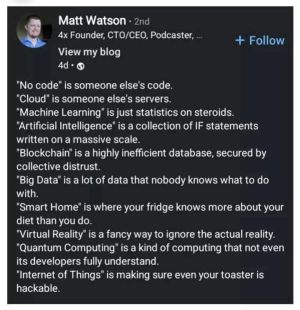Buzzwords
Decoding the Matrix: Why You Shouldn't Believe the Hype (or Your Smart Toaster)
We live in an age of technological buzzwords, a digital Tower of Babel where every new innovation is shrouded in layers of marketing jargon. From "no-code" to "quantum computing," these terms are designed to impress, to intimidate, and, most importantly, to sell. But behind the slick marketing campaigns and futuristic promises lies a simpler, often less glamorous reality.
As the wise Matt Watson (Unconfirmed Identity) so eloquently put it:
- "No code" is someone else's code.
- "Cloud" is someone else's servers.
- "Machine Learning" is just statistics on steroids.
- "Artificial Intelligence" is a collection of IF statements written on a massive scale.
- "Blockchain" is a highly inefficient database, secured by collective distrust.
- "Big Data" is a lot of data that nobody knows what to do with.
- "Smart Home" is where your fridge knows more about your diet than you do.
- "Virtual Reality" is a fancy way to ignore the actual reality.
- "Quantum Computing" is a kind of computing that not even its developers fully understand.
- "Internet of Things" is making sure even your toaster is hackable.
Let's break down this digital Rosetta Stone and expose the truth behind the hype.
No-Code: The Illusion of Effortless Creation
The promise of no-code platforms is alluring: build complex applications without writing a single line of code. But as Matt points out, this is a clever sleight of hand. You're not magically creating software out of thin air; you're simply using someone else's pre-written code, often in a restrictive and less flexible environment. It's like building a Lego castle – impressive, but you're still using pre-made bricks.
The Cloud: The Great Server Relocation Project
The "cloud" evokes images of ethereal data floating in the digital ether. In reality, it's just a bunch of servers housed in physical data centers somewhere. You're not escaping the physical world; you're just renting space in someone else's computer.
AI: The Reign of the IF Statements
Artificial intelligence is often portrayed as a sentient, almost magical force. In reality, much of what we call AI today is simply a sophisticated form of pattern recognition and decision-making based on vast amounts of data. As Matt astutely observes, it's essentially a massive collection of "IF" statements, albeit incredibly complex ones.
The Rest of the Gang: From Blockchains to Toasters
The rest of Matt's observations are equally insightful. Blockchains, while revolutionary in some respects, are undeniably inefficient databases. Big data is often just a chaotic mess of information that companies struggle to analyze. Smart homes, while convenient, raise serious privacy concerns. Virtual reality offers an escape from reality, but at what cost? And the Internet of Things, while promising increased connectivity, also expands the attack surface for hackers.
The Takeaway: Don't Believe the Hype (and Maybe Unplug Your Toaster)
The point of this satirical exposé isn't to dismiss these technologies entirely. Many of them offer genuine benefits and have the potential to improve our lives. However, it's crucial to approach them with a healthy dose of skepticism.
Don't fall for the marketing hype. Don't be intimidated by the jargon. Remember that behind the buzzwords lies a more grounded reality. Do your research, understand the underlying technology, and don't let your smart fridge know more about your diet than you do. And for goodness sake, maybe unplug your toaster when you go on vacation. You never know what it might be telling the internet.

